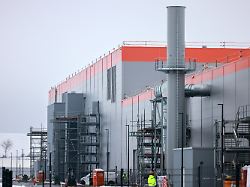Mega factory in Thuringia
Battery giant CATL starts production in Germany
01/26/2023, 5:55 p.m
Batteries are the heart of e-mobility. All well-known manufacturers pound their own works out of the ground. Series production of the Chinese industry giant CATL is now beginning in Thuringia. One of the customers is BMW.
The Chinese battery giant CATL has put its first factory in Europe into operation in Arnstadt, Thuringia. Up to 30 million battery cells can be manufactured in Bavaria every year. The group is one of the largest cell producers in the world. With the factory, he pushed forward in Germany in the production of one of the most important components for electric vehicles. The German automobile manufacturers also have major battery projects and are planning to invest billions, but they are still a long way from commissioning.
“Here we have a gigafactory that has not been seen anywhere in Western Europe before,” said Thuringia’s Prime Minister Bodo Ramelow. Experts also speak of a giant factory for lithium-ion cells that CATL is currently ramping up. Up to 1.8 billion euros flow into the project, said CATL Europe President Matthias Zentgraf. “This will be the first large-scale cell production in Western Europe.” European car manufacturers are to be supplied, for example BMW is a customer according to its own statements. BMW then uses the cells to manufacture batteries itself, for example in Dingolfing and Munich.
Up to 2000 jobs and 350,000 e-cars
The mighty hall with solar systems on the roof, in which the first production line for cells is located, is about half a kilometer long. According to Zentgraf, five more are to follow in the coming months. 400 specialists from China alone were flown in to start up the plant together with around 600 of their German colleagues. The Contemporary Amperex Technology Ltd. (CATL/Ningde) around 70 hectares in 2018. A few months later than planned due to Corona, the international team manufactured the first cells under series conditions shortly before Christmas 2022. Zentgraf expects the regular start of series production in mid-2023. By the end of the year, 1,800 to 2,000 jobs are to be created – there is still a lot of staff being sought.
The plant was initially designed for a capacity of 14 gigawatt hours, which would probably be reached early next year, said Zentgraf. An annual production of around 30 million cells is possible. “Depending on the size of the batteries, this can be used to equip 185,000 to 350,000 electric cars.” Approval is expected for up to 24 gigawatt hours – it will be used depending on the cell requirements of the automotive industry. Another plant is planned in Hungary.
And what is the German car industry doing? In addition to projects abroad, Volkswagen has been building its first battery cell plant in Germany in Salzgitter since summer 2022. Together with various partners, Mercedes-Benz plans to build several cell factories worldwide by 2030, which should have a total production capacity of 200 gigawatt hours. Batteries are to be assembled from the cells in nine Mercedes factories, including one in Kölleda, Thuringia. The Opel mother Stellantis is also on the road with partners and relies on three factories, including in Kaiserslautern, where the start is planned for 2025.
At the CATL plant opening there were also concerns about the future China strategy of the federal government and the EU. The CATL project is a new type of cooperation, said Thuringia’s Economics Minister Wolfgang Tiefensee. “The Chinese bring their technology to Europe.” Not far from the plant, Thuringia is building a battery research center – “there is joint research”. He hopes that the discord in the debate about a new China strategy “is only a temporary phenomenon,” said Zentgraf.
